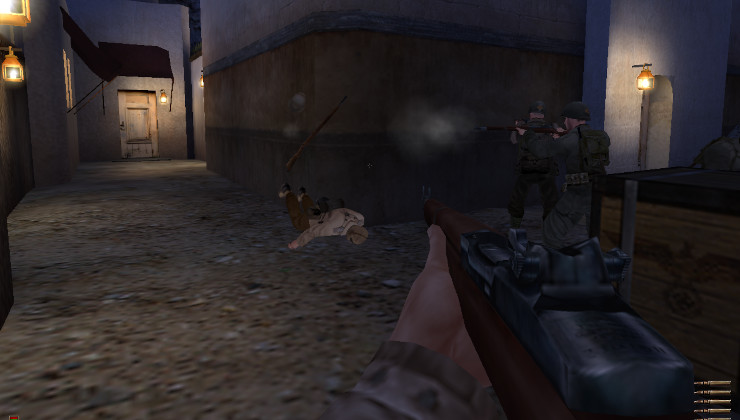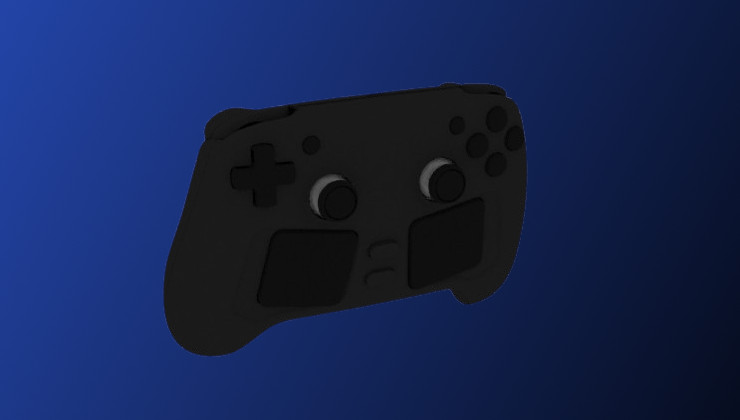Valve and game developers have a bit of a fight on their hands here, with a French court ruling that Valve should allow users to re-sell their digital games.
Reported by the French website Next Inpact, the French consumers group UFC Que Choisir had a victory against Valve as French courts have ruled against them on the topic of reselling digital content. From what I've read and tried to understand, the courts have basically said that when you buy something on Steam it is indeed a proper purchase and not a subscription.
Valve has been ordered to pay damages at €20K plus €10K to cover some costs. On top of that, they will also have to publish the judgement on Steam's home page (presumably only for users in France) and for it to remain visible for three months. If they don't, they will get a fine for each day of €3K. To Valve though, that's likely pocket change. The bigger issue though, is how other countries inside and outside the EU could follow it.
Speaking to PC Gamer who got a statement from Valve, they are going to fight it. Of course they will though, they could stand to lose quite a lot here and it would set a pretty huge precedent for other stores like GOG, Epic, Humble, itch and all the rest.
There's a lot to think about with this situation. Valve could end up changing the way they deal with this, just like they did with the nicer refunds option which came about after legal issues too. Imagine being able to sell and transfer a game over to another Steam user. Valve could take a cut of that most likely too.
Something to think on there is how this could affect game developers too, I'm all for consumer rights but I do try to think about all angles. We could end up looking at higher prices overall, no release day discounts, more micro transactions, more games updated as a constant service, games that require an online account as a service so you're not paying for an actual product and so on as developers try to keep more income when many smaller developers are already struggling.
Interesting times.
Hat tip to Nibelheim.
Quoting: AciDFor a website promoting Linux, and hence the freedom it brings, I'm ASTONISHED by the very, very narrow views some of the commenters are trying to explain here.
A law will give the consumer more liberty, and you see that as bad?!
Please.
Also, for those who keep repeating 'stores should drop the French market', you first need to understand how the EU market works.
Scratch that, those of you talking about how X could affect Y should first take a deep breath, then learn how a free market work compared to one with monopolies (which you are promoting).
I still can't believe we are seeing those type of comments on a Linux website!
The problem is that this could be a right do harm. Also. there will be no benefit. Big players won't simply give up parts of their income. They will simply change the rules to something we most probably have less rights in than ever before. At the very least it will lift prices.
Last edited by Nevertheless on 20 September 2019 at 8:31 am UTC
Quoting: AciDFor a website promoting Linux, and hence the freedom it brings, I'm ASTONISHED by the very, very narrow views some of the commenters are trying to explain here.
A law will give the consumer more liberty, and you see that as bad?!
Please.
Also, for those who keep repeating 'stores should drop the French market', you first need to understand how the EU market works.
Scratch that, those of you talking about how X could affect Y should first take a deep breath, then learn how a free market work compared to one with monopolies (which you are promoting).
I still can't believe we are seeing those type of comments on a Linux website!
Not every "freedom" is a good idea. The current system works very well. This will disrupt it with no benefit.
Quoting: AciDFor a website promoting Linux, and hence the freedom it brings, I'm ASTONISHED by the very, very narrow views some of the commenters are trying to explain here.
A law will give the consumer more liberty, and you see that as bad?!
Please.
Also, for those who keep repeating 'stores should drop the French market', you first need to understand how the EU market works.
Scratch that, those of you talking about how X could affect Y should first take a deep breath, then learn how a free market work compared to one with monopolies (which you are promoting).
I still can't believe we are seeing those type of comments on a Linux website!
No-one is disputing that more liberty is "good". But it's a naive view that there's no price to that liberty. Many of those "narrow" views you're referring to are simply savvy of the likely catastrophic effect that this liberty will have on the industry. Indie devs will see revenue drop off to the point that they simply can't make a profit (most are already struggling to do so). AAA devs will move to a model of subscription or even more aggressive microtransactions to compensate for the resale model causing a drop off of new sales.
More liberty is great. It's just the consequences of all that freedom that we're discussing.
Quoting: subThere is no price on the consumption of the game anymore, which is what the
developer actually wants to get paid for - and that's fair, isn't it?
I have to agree with that one. Viewing purchases of content as a product purchase was always a bit of a crutch, that only worked due to the limitations imposed by physical media.
If you have played all of a game or read all of a book, you have basically worn it out, at least for your own purpose -- except for nostalgia. Selling it would require and effort in time and money, creating a minimum asking price where it is still worthwhile, while the product will not be seen as equal to a new copy.
With digital sales there is a additionally the aspects of continuous service. Updates, support, downloads... I could see Valve splitting game prices into a service fee and a game price.
My worst fear is that this will push Devs away from the single player games I like to more F2P, P2W multiplayer and gaming as a service. The last part might not be entirely bad, but as I have less and less time for games, it might just force me to drop gaming all together.
Quoting: KlausQuoting: subThere is no price on the consumption of the game anymore, which is what the
developer actually wants to get paid for - and that's fair, isn't it?
I have to agree with that one. Viewing purchases of content as a product purchase was always a bit of a crutch, that only worked due to the limitations imposed by physical media.
If you have played all of a game or read all of a book, you have basically worn it out, at least for your own purpose -- except for nostalgia. Selling it would require and effort in time and money, creating a minimum asking price where it is still worthwhile, while the product will not be seen as equal to a new copy.
With digital sales there is a additionally the aspects of continuous service. Updates, support, downloads... I could see Valve splitting game prices into a service fee and a game price.
My worst fear is that this will push Devs away from the single player games I like to more F2P, P2W multiplayer and gaming as a service. The last part might not be entirely bad, but as I have less and less time for games, it might just force me to drop gaming all together.
Fully agree.
Also, the argument that you can trivially copy a digital "good" and therefore must be cheaper sounds like complete non-sense to me.
As if a dev/publisher puts a price tag on the binary...
Ofc, they want to get paid for the experience (per person).
It's like arguing with the ticket man to let me into the cinema for free as there are still spare seats left and the show runs anyway.
I have never faced someone complaining to pay for the "experience".
Ofc, I came across plenty that complained about cinema prices here. Fair enough.
Last edited by sub on 20 September 2019 at 8:55 am UTC
Still, I hope this will happen. There will surely be chaos at first, but it will be a much fairer market in the end.
Last edited by const on 20 September 2019 at 9:06 am UTC
Last edited by gojul on 20 September 2019 at 9:41 am UTC
People are putting the voice in the heavens for a certain plausible price increase in games and less sales. To this, I would like to say that a price increase should be welcome. The current price for many games is artificially down, making indie devs cut and life miserable for the most part, due to many things, amongst them the fact that there is a wild fight and a massive amount of games being released every day. Which reminds me, that in the 80s the crash in the industry happened for a very similar reason.
Therefore, in my opinion, a price increase and less sales would salvage the industry from its crash. And as a consumer, to be honest, I rather pay full price for a game and play it, because I originally am looking forward to having it, rather than compulsively buy during the sales and perhaps never play the game. I don't know about you, but my friends and some people on the internet are constantly complaining about the amount of games in the backlog that is ever-increasing, etc. Granted, that should be easy to palliate with self-control but let's be fair here; the continuous sales, adverts and offers end up breaking through until we give in and buy a product. For example, this kind of pricing, higher per game, is more common on consoles, specifically on Nintendo platforms, and don't see a big issue with paying full price for games in that community.
Now, dev companies might not like this ruling. Perhaps they prefer go to a subscription model like Spotify, or Netflix... Well, unless they do some research and see that except the big names most people won't really make a profit on those platforms either. Being able to sell 2nd hand games won't change that greatly.
Let's face it, indie developers will suffer either way, as much as freelancers, indie bands/film studios and small shops/businesses owners do. Why should devs be different? In this current economic model, that is. But that's a talk for another topic/post.
Anyway, there isn't a perfect world/solution, but capping consumer rights, in name of capitalism freedom and keeping the state out of this (Fuck an-caps) to keep the status-quo won't cut it.
Last edited by Arehandoro on 20 September 2019 at 9:48 am UTC
Quoting: subQuoting: SalvatosQuoting: pbThat's it, I'm telling my son right now to stop dreaming of developing games. This basically legalises keyshops and now even allowing you to sell the games you're already played and finished, if it wasn't bad enough before... Piracy killed Amiga gaming, socialism will kill PC gaming?Can we maybe not be so dramatic? Some of us are old enough to remember that that’s how it was for the majority of video gaming’s existence. And books, DVDs, cars, etc. Sure it would be a disruptive change, but as long as it doesn’t open the door to duplication (piracy), the market can adapt. It might not be pretty for a while, but it won’t just die like that.
I'm not yet having a position on all this yet, tbh.
Being honest, this pure digital distribution is different to what
we had back then for games or even more for the book example.
If you sell a used book, it's used - no matter how hard you try.
Those old game boxed were usually plastic sealed and you had to open them.
From my experience the cardbox boxes suffered as did the jewel case plus the CD.
All I want to say is this: Usually a used product is not mint anymore.
It shows signs of use that is represented in the price when you resell it.
This is completely gone for digital products.
You sell something that's perfectly the same as you bought it first hand.
There is no price on the consumption of the game anymore, which is what the
developer actually wants to get paid for - and that's fair, isn't it?
It's a dilemma.
Not entirely true.
When one buys a 2nd hand book, film, album or game, does the content differ? Is the content less enjoyable because the medium it comes in isn't in mint condition? In my case, I know the answer to both questions (NO).
One might decide to pay less for the state of that format but ultimately the importance here is what you do with that content. Therefore, Valve's case isn't different to existing consumer rights and market laws. Besides, let's not forget that more often that not 2nd hand books are equally, if not more, expensive that new ones in many situations AND that 2nd hand market is completely out of companies revenues. In a platform like Steam, if 2nd hand were to be enabled, they could, and they will, still control how it works getting a chunk of every sale for them as platform and for the dev. Which I believe, it should create another topic in itself.
Last edited by Arehandoro on 20 September 2019 at 10:00 am UTC
Quoting: AnanaceSomething to make "new" copies somehow different from "used" ones, to make sure that there's at least some reason for people to want to pay more for a "new" copy rather than a bit-perfect "used" one.
I like this idea. For example, disable achievements, leaderboard and cloud saves, because you did not pay the full price, which includes these "extra services".
Overall I am not happy with this and I fear a negative impact on a market.
They only thing I would be happy about if I was in France, I could buy a Windows laptop and then resell Windows license. :D
Quoting: ArehandoroWhen one buys a 2nd hand book, film, album or game, does the content differ? Is the content less enjoyable because the medium it comes in isn't in mint condition? In my case, I know the answer to both questions (NO).
For me, the content of a book is less enjoyable, if the book is crumbled, stinks because the pre owner was smoker or has stains for example from dirty fingers. The binding of a book also breaks down through use.
But all this does not happen to a digital copy of a game. The pre users were smoking or played it a lot, or they had dirty fingers while playing... DOESN'T MATTER. The used copy is always as good as an unused one.
Last edited by einherjar on 20 September 2019 at 11:08 am UTC
Quoting: KuduzkehpanThis will affect poor countries in positive way.Also ability to re-sell games will create a big marketing between players and maybe it creates a blackmarket inside the whole gamer community. At least i will be happy to sell my games and get some profit for re-investments and other development purposes.
Also i prefer a renting system which protects both developers and costumers in same time. Just for cases like
"facepunch and rust" as follows pay 10 dolar euro or whatever to rent a game for 3 months. Then decide to buy or not. This is also why DEMO's are up and running.
Not sure of that. If publishers discover that selling games on poor countries undermines the sales on the rich ones, they will simply increase prices on poor countries or stores will add more restrictions to those markets.
Quoting: einherjarBut all this does not happen to a digital copy of a game. The pre users were smoking or played it a lot, or they had dirty fingers while playing... DOESN'T MATTER. The used copy is always as good as an unused one.I'm not sure why you all get worked up about such minor details. It's pretty obvious that digital and physical products are not the same.
The issue at hand is that when those digital markets formed they where until now pretty unregulated and extremely one sided when it comes to consumer rights. It was basically always "If you want that game you have to agree to our completely stupid EULA or GTFO". This is now changing. They didn't had refunds either until they got forced to do them.
It is an illusion that those markets will regulate themselves. They themselves are pushing for laws as much as they can to cement their full control, like for example the law that prevents you from tampering with DRM even if they shutdown the online service and the product you purchased becomes useless.
It is about time that the consumer side gets represented and we get back to a reasonable fair market that isn't so one sided when it comes to ownership and what you can do with your own stuff you actually payed for. There has to be done a lot more and hopefully the right to do the same thing with an account will hopefully be next.
Last edited by ZeroPointEnergy on 20 September 2019 at 11:37 am UTC
Quoting: ShmerlHm, according to this. EU already allowed it before. So what's new in this ruling?
https://en.wikipedia.org/wiki/First-sale_doctrine#Application_to_digital_copies
QuoteIn Europe, the European Court of Justice ruled, on July 3, 2012, that it is indeed permissible to resell software licenses even if the digital good has been downloaded directly from the Internet, and that the first sale doctrine applied whenever software was originally sold to a customer for an unlimited amount of time, as such sale involves a transfer of ownership, thus prohibiting any software maker from preventing the resale of their software by any of their legitimate owners.[5][6][7] The court requires that the previous owner must no longer be able to use the licensed software after the resale, but finds that the practical difficulties in enforcing this clause should not be an obstacle to authorizing resale, as they are also present for software which can be installed from physical supports, where the first-sale doctrine is in force.[8][9] The ruling applies to the European Union, but could indirectly find its way to North America; moreover the situation could entice publishers to offer platforms for a secondary market.
It's not "new" because it's not a new law, it's a ruling. Valve's EULA contains illegal clauses, the ruling confirms it.
Quoting: EhvisI think people are making far more fuss about this than what is really going on. It appears to me that the ruling is about the passages in the licence agreement that forbid users from reselling their games. I suspect that all that is needed for Valve (and other stores) is to remove those passages and inform the users that this is in fact legal. However, nowhere does it really say that Valve needs to implement a system for people to resell individual games to other users. Which means that all that the net effect maybe that you will be allowed to resell your entire account. How many users will that benefit?
This reminds me of the good old wow times, when you had to go to the chinese to illegally buy a lv 60 Tauren druid. Now we could just all go to the cow market parisienne. :D
Quoting: ZeroPointEnergyQuoting: einherjarBut all this does not happen to a digital copy of a game. The pre users were smoking or played it a lot, or they had dirty fingers while playing... DOESN'T MATTER. The used copy is always as good as an unused one.I'm not sure why you all get worked up about such minor details. It's pretty obvious that digital and physical products are not the same.
Yes, so the reselling can not be treated the same. It is not a minor detail. If you can sell something millions of times, without it getting worn down, it is not a minor detail.
The developer must get the money for his job with a significantly lower amount of sales.
Quoting: ZeroPointEnergyIt is an illusion that those markets will regulate themselves. They themselves are pushing for laws as much as they can to cement their full control, like for example the law that prevents you from tampering with DRM even if they shutdown the online service and the product you purchased becomes useless.
But regulating them in the same way as physical goods (that can only be sold a limited time) is also not the best idea.
Of course a lot of things can be made better - but in a smart way. And this seems not to be a smart way.
It leeds us to even more "software as a service" and monopolism.













See more from me